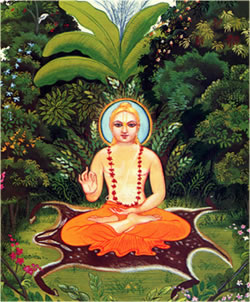
Kapila, (flourished 550 bce?), Vedic sage who is often identified, with others, as the founder of the system of Samkhya, one of six schools of Vedic philosophy. He is not, however, the author of the text primarily responsible for giving the school its philosophical definition: Ishvarakrishna’s Samkhya-karika (c.4th century ce).
According to Hindu sources, Kapila was a descendant of Manu, the primal human being, and a grandson of the creator-god Brahma, or he was an avatar of the god Vishnu. The important religious text the Bhagavadgita pictures him as a recluse associated with yogic adepts (siddhas). The Samkhya system attributed to Kapila has had a considerable impact on the Hindu tradition as a whole, especially through its close association with Yoga, as symbolized in Kapila’s own asceticism. For example, Samkhya forms a notable part of the philosophical background of the Bhagavadgita. In mythology, Kapila is portrayed as an exemplar of yogic stringency. His hermit regimen is said to have produced in him an inner store of such intense heat that he was capable of reducing to ashes the 60,000 sons of the Vedic king Sagara.
Buddhist sources present him as a well-known philosopher whose students built the city of Kapilavastu, according to one tradition the birthplace of the Buddha. Though there are many similarities in the philosophies of the Buddha and Kapila (e.g., stress upon meditation as a technique for removing suffering, belief that the Vedic gods were subject to limitations and conditions, and dislike of ritual and of Brahmanic doctrines), Kapila did not establish a religious community.
No comments:
Post a Comment